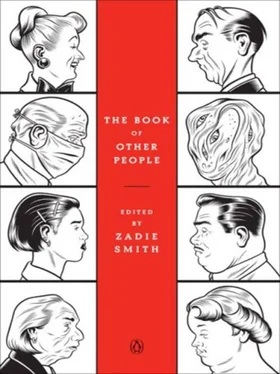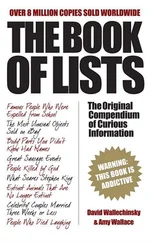
David Mitchell, Daniel Clowes, A. L. Kennedy, ZZ Packer, Andrew O’Hagan, Zadie Smith, Nick Hornby, Edwidge Danticat, Aleksandar Hemon, Chris Ware, Hari Kunzru, Toby Litt, Adam Thirlwell, Heidi Julavits, George Saunders, Safran Foer, Vendela Vida, Miranda July, A. M. Homes, Dave Eggers, Jonathan Lethem, Colm Tóibín, Sean Greer
The Book of Other People
© 2007
The Book of Other People is about character. The instruction was simple: make somebody up . Each story was to be named after its character: ‘Donal Webster’ by Colm Tóibín, ‘Cindy Stubenstock’ by A. M. Homes, ‘Frank’ by A. L. Kennedy, and so on. When the commission was sent out, there were no rules about gender, race or species. This freedom resulted in ‘The Monster’ by Toby Litt and ‘Puppy’ by George Saunders. Late in the making of this book I tried to make a case for first and last names, for reasons of uniformity. The idea was not popular. Reproduced here is Edwidge Danticat’s protest, convincing in its simplicity: ‘I think the variety of names is good. It makes it less monotonous-looking. Since people are named different things by different people.’ Surnames have not been forced upon Danticat’s ‘Lélé’ or Adam Thirlwell’s ‘Nigora’ or on any others who did not want them. In one case, the omitted last name is the deliberate secret upon which the story hinges. In another – to use a distinction of Simone Weil’s – the character is a sacred human being and not a ‘person’ or ‘personality’, and his particular name is not important.
There are twenty-three stories in this volume, too many to mention individually. Each is its own thing entirely. The book has no particular thesis or argument to convey about fictional character. Nor is straight ‘realism’ or ‘naturalism’ – if such things exist – the aim. The hope was that the finished book might be a lively demonstration of the fact that there are as many ways to create ‘character’ (or deny the possibility of ‘character’) as there are writers. It is striking to see how one simple idea plays out in individual minds, the ‘character’ of the prose itself being as differentiated as the ‘other people’ with which these stories are nominally populated. As editor, I have tried to retain the individuality of each piece by leaving them, by and large, little changed.
There is, however, an element of their character that has been removed: the fonts. Publishers standardize fonts to suit the style of the house, but when writers deliver their stories by e-mail, each font tells its own story. There are quite a few writers in this volume who use variations on the nostalgic American Typewriter font (and they are all American), as if the ink were really wet and the press still hot. We have two users of the elegant, melancholic Didot font (both British), and a writer who centres the text in one long, thin strip down the page, like a newspaper column (and uses Georgia, a font that has an academic flavour). Some writers size their text in a gigantic 18. Others are more at home in a tiny 10. There are many strange, precise and seemingly intimate tics that disappear upon publication: paragraphs separated by pictorial symbols, titles designed just so, outsized speech marks, centred dialogue, un-centred paragraphs, no paragraphs at all. It seems a shame to lose these idiosyncratic layouts and their subtle effects. Anyway: I hope what remains will satisfy.
Before leaving you to the stories themselves, I’d like to speak briefly of a technical matter, one that is usually considered to be in bad taste if you are speaking of the ‘Art of Fiction’: money. This book is a ‘charity anthology’, which means the editor must ask writers to work for free, knowing full well that a ‘story’ is like a gas that expands into whatever available space one has. When you begin a story it’s impossible to say how much time will pass before you’re able to finish it. It might take two hours of your time, or a few days, or four months, or more (this is particularly true for graphic novelists). So it was with this project. I want to thank all the writers for putting time aside – sometimes a great deal of time – to do something for nothing. Traditionally, writers denounce the very idea of writing for no remuneration (‘I don’t want the world to give me anything for my books,’ George Eliot once said, ‘except money to save me from the temptation of writing only for money’), but maybe there is also an occasional advantage in writing once again as you wrote in the very beginning, when it was still simply writing and not also a strange breed of employment. It is liberating to write a piece that has no connection to anything else you write, that needn’t be squished into a novel, or styled to fit the taste of a certain magazine, or designed in such a way as to please the kind of people who pay your rent. In The Book of Other People we find writers not only trying on different skins but also unlikely styles and variant attitudes, wandering into landscapes one would not have placed them in previously. I recommend them to you with the proviso that their order is simply alphabetical (by character). Each reader should line them up as they like.
The beneficiary of this book is 826 New York, [1]a non-profit organization dedicated to supporting students aged six to eighteen with their creative and expository writing skills, and to helping teachers inspire their students to write. So The Book of Other People represents real people making fictional people work for real people – a rare example of fictional people pulling their own weight for once.
Zadie Smith
6 March 2007
Rome
Judith Castle by David Mitchell
‘Hello? Judith Castle?’
‘This is she.’
‘My name’s Leo Dunbar. I’m Oliver’s – ’
‘Oliver’s brother ! Oh, I’ve heard bucketloads about you , Leo!’
‘Uh… likewise, Judith. Look, I’m – ’
‘All rapturous, I trust?’
‘I’m sorry?’
‘What Olly’s told you. About little old moi . All rapturous, I trust?’
‘Look, Judith, I have… some, well, some rather dreadful tidings.’
‘Oh, I know! And let me tell you, I’m spitting kittens about it.’
‘You… know ?’
‘It’s all over the news, of course.’
‘ What? ’
‘A national rail strike is national news, Leo! The very weekend I’m due to come down to Lyme Regis and consummate my relationship with Olly, those bloody train drivers go on strike! It’ll be back to the seventies, spiralling inflation, Saturday Night Fever and uppity Arabs all over again, mark my words. These things go in cycles. Still, no union bully is going to stand between your brother and me. Now I do drive, but motorways bring on my migraine, as Olly has doubtless explained. Are you driving up to fetch me, or is he?’
‘Judith, my news was a little different.’
‘Spit it out, then.’
‘Oliver’s… dead, actually, Judith… Judith? Are you there?’
‘But our suite is already booked. A de luxe double. The girl at, at, at the Hotel Excalibur took my credit card number. It’s all confirmed. I told Oliver yesterday. Olly wasn’t dead then. He wasn’t even ill.’
‘It was a hit-and-run. He went to buy a bag of frozen peas, but never made it back. The ambulanceman said he was… the ambulanceman said Oliver would have been dead before he landed.’
‘But this is… outrageous…’
Читать дальше













